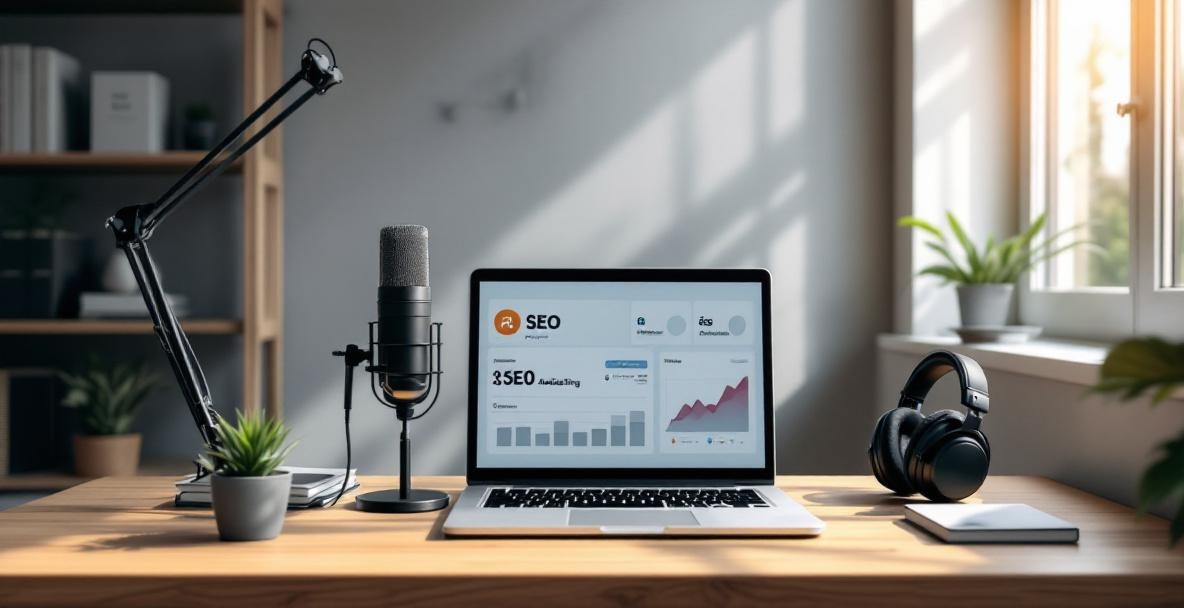You’ve poured your heart into your podcast, but if no one finds it online, all that hard work might go to waste. Even fantastic shows can get buried when search engines just don’t pick them up. Many podcasters face this problem because their website does not rank high enough. Boosting your podcast’s SEO is the key to connecting with more fans and growing your audience.
Why Your Podcast Website Needs SEO Help

Fighting to Stand Out
There are over 2 million podcasts out there, and it isn’t easy to catch new fans’ attention. You can spend hours polishing an episode, yet still see only a handful of listeners find it. Many podcasters experience this struggle because their websites do not show up in top search results. Using simple SEO techniques can help bridge the gap between your great content and the people searching for it.
Figuring Out Podcast SEO
Podcast SEO is not the same as regular website SEO. It goes beyond just text and must cover how your audio shows are found across different platforms. Since search engines cannot play your audio, they rely on titles, descriptions, and transcripts to know what you offer. At Castee, we understand that smart SEO can change your podcast’s reach. Although we don’t provide a platform for technical tweaks, we offer valuable resources and guidance. You can check out Neil Patel’s detailed guide to podcast SEO for more insights. By using smart SEO practices, you give fans plenty of ways to discover your show, whether they search on Google or listen through their favorite podcast app.
Choosing the Right Keywords

Why Good Keywords Make a Difference
Keywords form the backbone of any solid SEO plan. They are the words and phrases that your future listeners type in when looking for new podcasts. For example, phrases like "interview podcast about marketing" or "true crime storytelling show" can help the right people find you. By using solid keywords, you align your content with what listeners are really after, which means you attract fans who are truly interested in your shows.
Helpful Tools for Keyword Hunting
You do not need to rely on guesswork when looking for the right keywords. Tools like Google’s Keyword Planner can show you search volumes and trends. Other tools such as Ubersuggest and AnswerThePublic reveal the common questions people ask about your topics, making it easier to plan episodes. It also helps to peek at popular podcast directories and see how similar shows describe themselves. Smart keyword research can boost your visibility, as recent stats from WritePerfectly show. At Castee, you can find insights that help you uncover keyword opportunities that others might be missing.
Fine-Tuning Your Podcast Web Pages
Writing Catchy Titles and Clear Descriptions
The titles and descriptions of your podcast episodes serve two key jobs. They help search engines understand your page and at the same time grab a potential listener’s interest. Your episode titles should include important keywords in a way that feels natural. Avoid using clickbait tactics that lure people in only to leave them disappointed. When writing your descriptions, be clear and detailed by adding relevant keywords naturally. Aim to give each episode its own unique summary that might even include show notes with timestamps. Catchy titles and clear descriptions are essential for drawing in more listeners and making your site more search-friendly.
Great Content Is King
While using keywords helps people find you, offering great content keeps them around. Search engines pay attention to how long visitors stay on your page and how quickly they bounce away. This means that you should deliver on the promises made in your titles with clear and helpful information. Transcripts are a smart way to boost your SEO because they let search engines “read” your audio. Adding full transcripts with speaker names and timestamps not only helps search rankings but also supports your audience. High-quality content and detailed transcripts can lift your site’s ranking and keep your listeners coming back for more.
Getting the Tech Right: Website Performance

Fast Loading and Mobile-Friendly Design
The speed of your website and how well it works on mobile devices can make a huge difference. If a site takes too long to load, visitors leave quickly, and that can hurt your SEO. Slow pages send signals to search engines that your site might not offer a good experience. With nearly 80% of listeners on mobile devices, it is vital that your site is responsive and easy to use. Make sure your design adjusts well across different screen sizes and that buttons are easy to tap. Fast and mobile-friendly design will keep your audience engaged and happy.
Using Sitemaps to Help Search Engines
A well-organized sitemap helps search engines quickly find every part of your site. For podcasters, this means keeping both a regular HTML sitemap and an updated podcast RSS feed. Your RSS feed should follow the correct guidelines and include full details for each episode so directories and search engines can sort your content properly. Make sure your XML sitemaps update automatically when you add new episodes. Regular sitemap updates and smart schema markup ensure that all your content gets noticed by search engines.
Growing Your Reach with Backlinks

Smart Ways to Earn Links
Backlinks are links from other websites that point to your podcast site, and they are very important for ranking well. Great chances to earn backlinks come from guest spots on other podcasts, interviews with industry sites, and content partnerships. When you appear on another platform, include a link back to your site with descriptive text that tells people what your show is about. Also, look for resource pages on websites that list useful content in your niche. Offering a friendly, personalized pitch about why your podcast’s unique value matters can lead to quality backlinks that support your growth.
How Social Media Can Help You
Even though social media links might not directly improve your search rank, their impact on discoverability is huge. Platforms like Twitter, Instagram, and LinkedIn send traffic to your podcast website and increase your online presence. Instead of posting the same message on every platform, tailor your posts so they fit each channel well. For example, you might share short audio clips on Instagram, ask fun questions on Twitter, and provide in-depth takes on LinkedIn. Using social media creatively opens up more pathways for new listeners to find your show.
Wrapping It Up: Your Next Steps
What You Need to Remember
Successful podcast SEO is not about one single trick. It means taking care of everything from picking the right keywords to making sure your website runs smoothly and gets promoted the right way. Each step, from your episode topics to the way you design your pages, works together to help more people find you. Remember that linking strategy and quality content go hand in hand to build a strong online presence.
What To Do Next
Take a good look at your podcast website and find small improvements you can make right away. Maybe add transcripts to old episodes or adjust your titles with the best keywords. Then, build a regular routine that makes SEO an integral part of how you launch new episodes. Begin with simple fixes and keep growing your strategy over time.
Ready to transform your podcast's visibility and grow your audience through proven SEO strategies? Castee offers an end-to-end podcast marketing solution designed specifically for podcasters and digital marketers. Our platform helps you implement everything discussed in this article-from keyword research to technical optimization-through intuitive tools built for podcast creators, not SEO experts. Visit us today to discover how we can boost your podcast's discoverability and help you build a thriving community of engaged listeners.
Leave a Reply